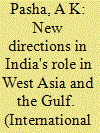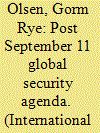| Srl | Item |
| 1 |
ID:
113259


|
|
|
|
|
| Publication |
2010.
|
| Summary/Abstract |
Friendly and beneficial relations with the countries of West Asia, and the Gulf region in particular, have remained a key component of India's foreign policy on account of geopolitical, economic and strategic interests. The reasons for significance of this region for India now go beyond the assured supplies of energy resources. While non-alignment as a bonding has declined in bilateral relations with countries like Egypt after the end of the Cold War, the opportunities for trade and investments have gained salience in India's relations with the Gulf Cooperation Council (GCC) countries. The political uncertainty over the representative character of regimes in many countries of the region, the political fallout of the United States' policies and interests in respect of Iraq, Iran and the Palestine issue, along with India's new priorities in the form of stronger linkages with both the US and Israel could impinge on India's role in the region. It is in India's economic and strategic interest to maintain a positive relationship with all the West Asian countries by avoiding any undue influence from the US or Israel. It is also incumbent on India to stand by the people's voice for the introduction of genuine democratic political systems in these countries.
|
|
|
|
|
|
|
|
|
|
|
|
|
|
|
|
| 2 |
ID:
082348


|
|
|
|
|
| Publication |
2008.
|
| Summary/Abstract |
The Africa policies of the United States and of the European Union seem to have undergone significant changes in the years following September 2001. Nevertheless, the paper shows that the choice of policy instruments has been path dependent in both cases. The American policy is not totally path dependent if the size of the military initiatives and the volume of development aid are included in the analysis. The Africa policy of the EU is path dependent even when the increase in development assistance is taken into account. The growth in EU aid can only be explained by reference to the influence of values and norms. Even though September 11 is a 'breaching point', path dependency and bureaucratic inertia seem to be able to explain most of the lacking changes. However, agency-based explanations are also necessary
|
|
|
|
|
|
|
|
|
|
|
|
|
|
|
|